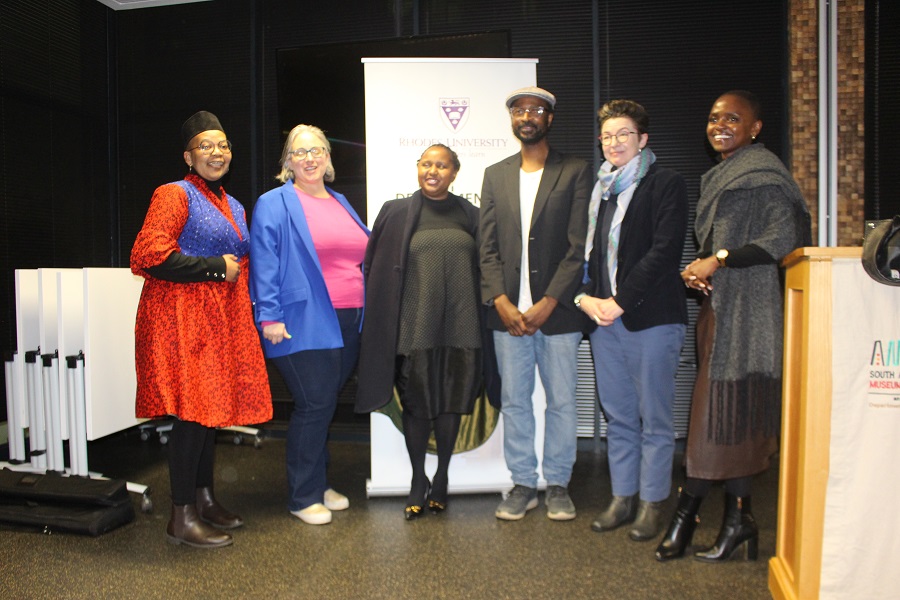By Benny Mojela
The Amazwi South African Museum of Literature was the stage for a thought-provoking event unveiling the “Routledge Handbook of Critical Studies in Whiteness”. This comprehensive academic work takes an incisive approach to understanding the concept of whiteness, and it drew together distinguished scholars and contributors for a dynamic discussion. Dr Kwezi Mzilikazi, Deputy Vice-Chancellor of Research, Innovation, and Strategic Partnerships at Rhodes University, inaugurated the session, setting the scene for a captivating exchange of ideas.
At the heart of the book launch event were contributors Dr Mandisi Majavu and Prof Christi van der Westhuizen, engaging in a compelling dialogue, deftly moderated by Lindokuhle Gama. The event, which took place on September 27, 2023, attracted a diverse audience to the Amazwi South African Museum of Literature.
Dr Mzilikazi welcomed the attendees and officially initiated the event, stating: “We are here to delve into a profound exploration of the concept of whiteness from a critical perspective, and it is our privilege to introduce this important work.”
The “Routledge Handbook of Critical Studies in Whiteness” delves deeply into the intricate ways in which whiteness operates as a social construct and thoroughly examines the far-reaching social, cultural, and political implications of white identity and privilege. Within the broader context of Critical Whiteness Studies, the book emerges as a response to critical race theory, aiming to deconstruct and scrutinize the construction of whiteness within society.
In her remarks, Prof Van der Westhuizen highlighted the distinction between two forms of whiteness, emphasizing: “Emboldened whiteness is very visible. It is the currently dominant version of whiteness. This is not whiteness hiding behind some kind of nice-looking liberal colour blindness; this is a whiteness that comes out and sort of claims that it is superior.” She gave examples from around the world, such as the storming of the Capitol in the United States and far-right movements in Europe, as instances of “emboldened whiteness”.
She contrasted this with “invisible whiteness,” saying: “This form of whiteness is different from invisible whiteness in that there is a bit of an adjustment to the previous decades where you have had a kind of invisibilized liberal whiteness.”
The book explores, in great detail, how whiteness is portrayed in various forms of media, examining how these representations shape perceptions and attitudes. The publication also delves into the intersections of whiteness with other elements of identity, such as gender, class, and sexuality. Dr Majavu, a contributor to the book, stressed the intersection of race and class in South Africa, noting: “Race and class intersect very closely in South Africa. It’s impossible to understand racism and race without looking at class and classism.”
The discussion at the event had significant implications for equity and transformation in academic institutions. Dr Claire Kelly, the director of the Office of Equity and Institutional Culture, asserted: “It explains a lot as to where we are as an institution. The kinds of resistances we see to transformation in the institution and, for me, bringing this lens to the way we read and understand the institution as well as how we are going to move forward is very important.”
She envisioned an institution where everyone is treated fairly, emphasizing: “For me, at a glance, you’d have an institution where things were fair and no one was treated badly, where everyone felt they could be their full human self and didn’t have to leave half of themselves at the door, where no one was brutalized.”
Dr Majavu reflected on the concept of non-racialism, saying: “I think non-racialism is a beautiful idea. We all want a society where race doesn’t matter, where race becomes totally irrelevant.” However, he also acknowledged the persisting racial problems and injustices, stating, “To correct the wrongs of the past, we can’t just drop race now; it just won’t make sense.”
Gama also provided her perspective on the definition of whiteness, describing it as “expressions of relations of power that are aimed at racialized bodies in order to sustain the superiority of white persons over non-white persons.” She emphasized the structural power and how it configures people’s lives within the framework of white supremacy.
In conclusion, the “Routledge Handbook of Critical Studies in Whiteness” stands as a comprehensive resource for scholars, researchers, educators, and students committed to unravelling and critically analyzing the complex dynamics of whiteness in contemporary society. The event was an intellectually stimulating experience that reinforced the critical importance of studying and understanding the concept of whiteness in today’s world.


